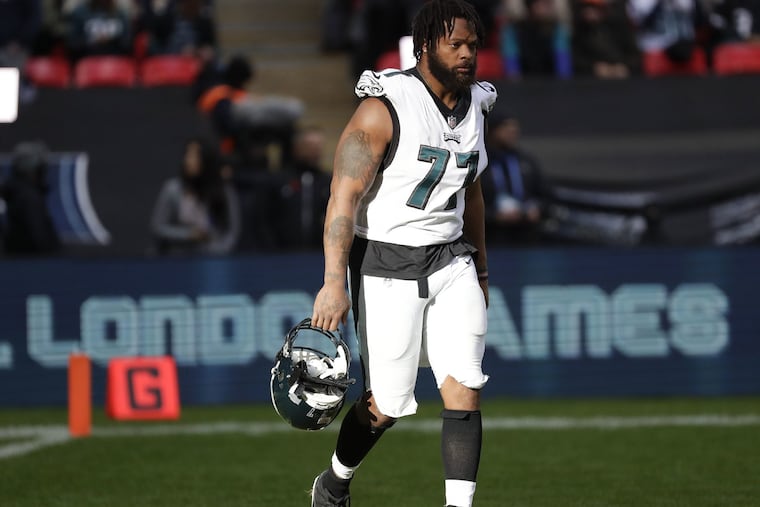Why Eagles’ Michael Bennett’s shoulder pads are so small
Pads have been getting smaller in the NFL for decades, but Bennett has taken the trend about as far as it can go.

Asked his view of fellow Eagles defensive lineman Michael Bennett's minimalist shoulder pads, Fletcher Cox laughed and replied with a question of his own:
"What shoulder pads?"
Right guard Brandon Brooks offered a similar take.
"He's in a T-shirt and drawers out there, man," Brooks said. "Whatever makes you more comfortable."
Bennett, who turned 33 on Nov. 13, is comfortable being a bit different. His NovaCare locker stall overflows with books, shoes, snacks, random boxes, assorted clothing. Since training camp, on the floor a few feet away from Bennett's stall sits a giant suitcase, big enough to hide a body in, overflowing with what seem to be ties and other dress clothes.
One thing in the stall takes up very little room, on the right side of the top shelf: Bennett's shoulder pads. In games, they appear as cupcake-sized lumps atop his No. 77 jersey. It's difficult to imagine trying to lower a shoulder clad in such a way into the path of a rampaging running back, or pulling guard. Latin American dictators in movies wear epaulets bigger than Bennett's pads.
"Not really," Bennett said, when asked if he'd ever gotten injured from a hit to the shoulder-collarbone area. "I've never really had one that I thought was bad."
So what's up with the tiny pads?
"They're special-made. Smaller in the body part, smaller in the shoulder part," said Bennett, who starts off with kicker/quarterback pads and gets them stripped down further. His main task is rushing the passer; he leads the Eagles with 5.5 sacks.
"A lot of people ask me – [for example, Tennessee Titans pass rusher] Brian Orakpo – a lot of different guys want to modify their shoulder pads. … I think it's all mental. It makes me feel lighter."
Earlier this season, Bennett had more to say on the subject in an interview with The New York Times:
"Small pads make me a better pass rusher," he said. "I've got complete range of motion and I use my hands more instead of just throwing my shoulder into someone. I engage with an offensive lineman the right way — with outstretched arms."
There are no NFL rules governing the size of shoulder pads, which got bigger through the 1960s and '70s, reaching what might be recalled as the Joan Crawford era of big shoulders in the '80s and '90s. They've been getting smaller roughly since the onset of the 21st century.
Players began to feel the big pads didn't make them all that invulnerable to injury, and as the game turned toward speed and passing, extra equipment weight was targeted.
Eagles defensive end Chris Long, who occupies the stall next to Bennett and who at one point mock-complained about the mountain of stuff spilling into his floor space, said he definitely wears totally different pads than his Hall of Fame father, fellow pass rusher Howie Long, wore in the '80s and early '90s.
"I'm glad they've changed," Long said. He said he has gone to smaller and smaller pads over the years, though not quite to Bennett's size.
"Arm flexibility – being able to reach out and work more moves, with extension," is a key benefit, Long said. "You just feel faster."
Long said pads don't offer as much protection as a fan might think.
"I've broken a rib under my shoulder pads. I've broken my sternum under my shoulder pads," Long said. "They don't always protect you, anyways. You might as well feel good."
Bennett, asked if anyone else in the NFL goes quite as small with the pads as he does, answered with the name of the quarterback Bennett and the Eagles will chase around the Superdome on Sunday. Indeed, Drew Brees is known for his tiny shoulder pads, among a few other things.
Last month, after Brees set the NFL all-time passing yardage mark in a game against the Washington Redskins, on the NFL Network postgame show, analyst James Jones sniffed disdainfully about how Brees "looks up over his little shoulder pads and helmet and he throws the ball to the open person," that he doesn't make "throws outside the pocket or [do] anything spectacular like that, so that's why he's not up there in the top 5."
Obviously, tiny shoulder pads aren't suitable for every position.
"I use my shoulders a little bit more, as far as blocking and stuff like that," Brooks said.
"I don't know if I could take on a fullback, at my weight, or take on a 300-pound offensive lineman, like [Washington's] Trent Williams at my weight, with those shoulder pads," middle linebacker Jordan Hicks said. "That's not for me."
Brooks said he certainly can see Bennett's point, though.
"It's a speed game nowadays. I get it. As a D-lineman, you probably don't want hands on you," he said. "Smaller, quicker, the less you can grab. I'm surprised it hasn't caught on more, to be honest."
Bennett said he got the idea from two pass-rushers he idolized growing up.
"Justin Smith and John Abraham," Bennett said. "They wore the smallest pads, and they were two of my favorite players growing up. I just copied them."
He said he went to his current setup around 2010, his second NFL season and first as a starter, in Tampa Bay. He said it might look as if he offers less area for an offensive lineman to hold onto, but "they'll still grab you. [Officials] never call holding anymore. They hold every play, and they don't call it anymore, like they used to."
In 2017, when Bennett was with Seattle, he went on Fox and was interviewed by analyst Shannon Sharpe, who asked Bennett about his shoulder pads.
"They're not little, I've just got shoulders like Paul Bunyan, man," Bennett said.